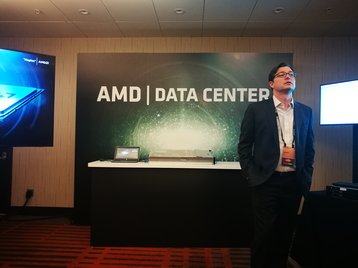Chip designer AMD is collaborating with Microsoft to incorporate the upcoming Naples processors into Project Olympus – an open source blueprint for hyperscale server hardware.
Naples is meant to signify AMD’s return to relevance in the data center: this line of x86 CPUs is based on the all-new Zen architecture and promises to give Intel a run for its money.
The partnership was announced at the Open Compute Project Summit in Santa Clara, California.
Trying new things
Project Olympus was originally introduced in October 2016 at the DCD Zettastructure event in London. It is not just a server ecosystem, but a new hardware development model that encourages wider community participation in the early design stages, heavily inspired by development methods used in open source software.
The first server released under this model consists of a universal server board, high-availability power supply with included batteries, 1U/2U server chassis, high-density storage shelf, a new universal rack PDU and a standards-compliant rack management card.
AMD says it was able to engage in the design process early on and foster a ‘deep collaboration around the strategic integration’ of Naples into the design of Project Olympus.
The upcoming, yet unnamed chips – Naples is just a codename - will feature up to 32 cores per socket, with two threads per core. They will support up to 16 DDR4 modules with up to eight memory channels, delivering up to 2TB of total memory capacity. Naples also features high-speed I/O supporting 128 lanes of PCIe 3.0.
The first crop of new processors is scheduled to be available in the second quarter of the year, with volume availability expected in the second half of 2017.
“Collaboration across the open source community is central to driving rapid innovation and creating a vibrant ecosystem for Microsoft’s Project Olympus,” said Kushagra Vaid, general manager for Azure Cloud Hardware Infrastructure at Microsoft.
“Partnership in design, such as our collaboration with AMD, shows how engaging early and often with hardware innovators can produce open source designs that are faster to market and customizable to enable flexibility and choice for end users.”
Also from the OCP Summit:
Microsoft shows ARM data center servers

